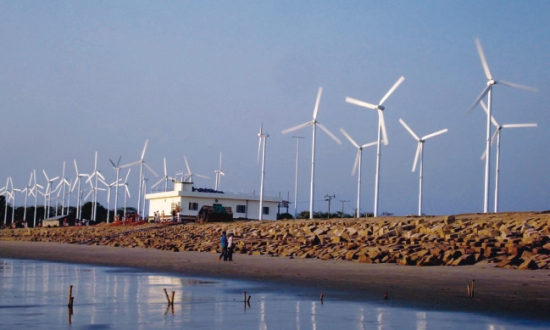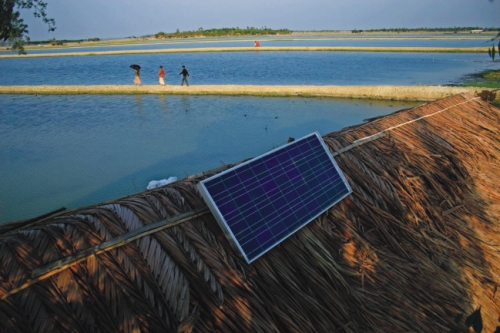
Inside
|
Energy is our basic means of survival, and globally we have been depending on oil, coal, natural gas, and nuclear power to meet the need. However, the crisis this path has led to -- rapid depletion and sky-rocketing energy prices; environmental consequences like global warming, acid rain and nuclear contamination; and political consequences like threatened national security and energy wars -- demands an urgent transition to energy options that are clean, affordable, secure, sustainable, and peaceful. Bangladesh is one of the worst victims; it is also in one of the most advantageous positions to make the transition.
Bangladesh is richly endowed with renewable energy resources. Abundant sunlight and heat, ample wind in the coastal areas, hilly sections and islands, gravity driven water flows of varied forms and speed, and the lush vegetation providing ample photosynthesis and bio-mass for fuel for a variety of purposes. Compared to Germany -- which has become an inspiring example of a country set on a full transition to renewable energy -- Bangladesh receives twice the amount of solar radiation. Bangladesh is an exceptional, naturally endowed and integrated, renewable energy mine. Judiciously harnessed, this energy mine has an untapped capacity far beyond meeting the country's daily demand of 4,000 megawatts of electricity, while also generating other forms of usable energy such as heat and bio-gas. Sunlight that falls on the Earth only for about one hour contains the same amount of energy we use globally in an entire year. Contrary to the publicised notion that it will take a miracle to solve Bangladesh's energy crisis, it is indeed a "development" blunder of monumental proportions that such a crisis could be contrived in Bangladesh. An infrastructure is evolving. A pilot phase with various renewable energy technologies began at the NGO, private, commercial, academic, and governmental levels during the late 1980s. Since the late 1990s, a much bigger combined thrust has come from more NGOs, governmental and semi-governmental agencies, universities and businesses. Currently, there are over 200,000 installed stand-alone PV (Photovoltaic) systems, generating over 7 megawatts of power. There are also about 17,000 mostly home-scale, bio-gas plants in Bangladesh, installed by the Fuel Research Institute of BCSIR, Brac, Grameen Shakti, and some other NGOs and private entrepreneurs. Although there are only a few installations, wind turbines, micro-hydro, and grid-connected PV systems show great promise. It's time to build upon this foundation on a massive scale. There are many options: stand-alone PV systems of various designs and scales; hybrid systems combining PV and wind turbines or ecologically balanced hydro-electric systems; distributed generation through grid-connected PV systems for urban and other gridded areas, installed on roofs and walls, which feed the grid with solar-generated electricity and reduce stress on the power line; solar powered IPS systems; solar thermal systems for heating and cooling; wind turbines ranging in sizes from 250 watts to over 3 megawatts each; utility-scale, megawatts-size, wind farms and PV fields, some combining electricity generation and agricultural production; off-shore wind farms; industrial and community scale bio-gas plants generating gas and electricity, with superb quality organic fertiliser and fish feed as the by-product; various types of solar cookers; solar greenhouses; PV, wind turbine and other renewable energy technology hardware manufacturing plants through turnkey transfer. All these options have successful examples around the world for Bangladesh to judiciously emulate and innovate. The capital cost will be minor compared to the alternative -- the dead-end fossil-nuclear path, leaving the country only more economically impoverished and indebted, environmentally ruined, and politically vulnerable. A national policy, with a Policy-Programs-Practice continuum, must be formulated and implemented, requiring the following: -Maximising conservation and efficiency in the use of non-renewables, while utilising them only as transitional resources. The multi-faceted energy crisis will have to be understood and addressed from multiple perspectives and skills. Bridges have to be built between policy makers and practitioners, economists and environmentalists, academics and field workers, specialists and generalists, educators and activists, industrialists and ecologists, program planners and implementers, problem researchers and problem solvers. Some bridges exist, but only as exceptions. We must engage in a dialogue and collaborate -- within the country and with the world -- in a shared vision and action. It's good for Bangladesh, and it's good for the world.
It may seem like a daunting -- even revolutionary -- task. But insisting on following a path which has led Bangladesh, and the world, to the crisis is not a solution -- it is suicidal. On the other hand, the revolutionary scope of renewable energy technologies offers us another choice, a hope, and a one-time opportunity to pave a path towards a solution. Bangladesh is capable of achieving the impossible. Against all odds and formidable opposition, the Liberation War proved it. An essential meaning and realisation of that blood-drenched liberation is now to be found in Bangladesh's claim, commitment and achievement of her energy independence and sustainability. The task amounts to nothing less than a national task with the utmost urgency -- and a call to action -- now! Organisations Encouraging Renewable Energy: The Infrastructure Development Company Limited (IDCOL), under the Rural Electrification and Renewable Energy Development Project (REREDP), with funding from the Global Environmental Facility, IDA of the World Bank, KfW, and GTZ, promotes Solar Home Systems through 16 partner organizations, which are included in the list below: - Grameen Shakti Sajed Kamal, EdD, teaches "Renewable Energy and Sustainable Development" at Brandeis University in Massachusetts, USA, and has directed renewable energy projects in the United States, Bangladesh, Sri Lanka, Armenia and El Salvador. He implemented the pioneering “A Photovoltaic Pilot Program for Bangladesh” (1986-1989), and was the consultant to the “BRAC Solar Energy Program for Sustainable Development” (1997-2000). His publications include Photovoltaics: A Global Revolution & Its Scope for Bangladesh (1989). In 2007 he was awarded Boston “Mayor's First Annual Green Award for Community Leadership in Energy and Climate Protection” and, in 2008, a “Lifetime Achievement Award” by the U.S. Environmental Protection Agency, New England Region.
|


